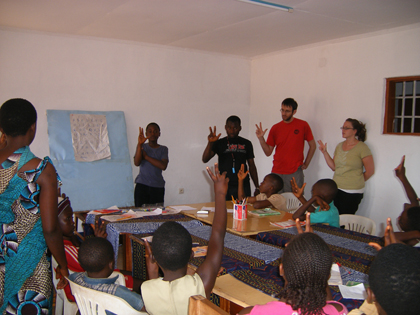When 11-year-old Lynn Cockburn’s father got a teaching job in a small village near Bamenda, the capital of Cameroon’s Northwest Region, her family moved there for two years. She recalls, “At first, it was really difficult for a small town Ontario girl to adjust to living in an African village.” But she came to love it. After coming back to Canada, she knew she would return to Cameroon one day – and that day came a decade ago. As a founding member of the International Centre for Disability and Rehabilitation (ICDR) at U of T in 2004, Cockburn took charge of ICDR’s Cameroonian group, along with fellow occupational therapist Kate Suffling. “Knowing the background and having personal relationships in Cameroon, I knew that I wanted to commit. I decided to see what I could accomplish there in 10 years.” “I was excited to go back and felt welcomed despite difficult circumstances,” says Cockburn. “Access to health care is expensive and limited by a low ratio of health-care providers to patients. People with disabilities are marginalized and have very limited opportunities in their lives.” The occupational science and occupational therapy professor’s approach to rehabilitation in Cameroon is three-pronged: help deliver direct care to people with disabilities, train therapists and care providers, and carry out research. More than 20 U of T occupational therapy students have learned about care delivery in Cameroon over the years, thanks to ICDR’s partnerships. “Our visiting students provide direct service to patients at a rehabilitation centre, as well as take on at least one or two research or clinical projects, so that they see a bigger picture of international disability and rehabilitation work.” When it comes to working with the local health-care providers, it is all about humility and openness for Cockburn and her Canadian colleagues and students. “One of the things that we’ve done really well in Cameroon is to provide spaces and opportunities to talk about issues related to rehab and disability,” says Cockburn. She hopes that there will one day be a rehabilitation program at the new University of Bamenda. The school’s visiting scholar program – which Cockburn helped set up – may be one step, providing new opportunities for scholars around the world to teach and work in Cameroon.
Recent Posts
U of T’s 197th Birthday Quiz
Test your knowledge of all things U of T in honour of the university’s 197th anniversary on March 15!
Are Cold Plunges Good for You?
Research suggests they are, in three ways
Work Has Changed. So Have the Qualities of Good Leadership
Rapid shifts in everything from technology to employee expectations are pressuring leaders to constantly adapt





